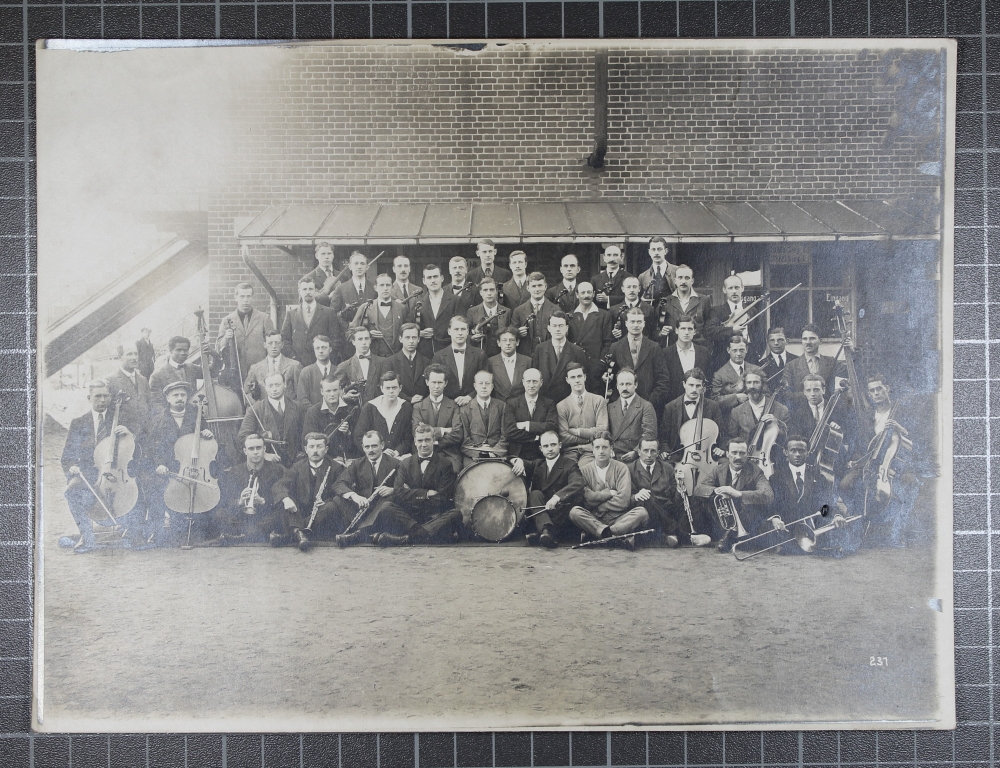Exhibition
Making Music in Manchester during WW1

Visit
musicmcrww1.wordpress.com/ for more stories found on our WW1 projects. This exhibition showcases some of the archives of the Royal Northern College of Music, the Hallé Concerts Society and the Henry Watson Music Library. Through looking through these three collections, we discovered that the First World War’s impact on Manchester’s music and musicians was profound. During the war, women were performing in the Hallé orchestra to replace the men at war only to be dismissed when they returned. Students and staff of the Royal Manchester College of Music served in the war. European students and teachers at the College were interned in Europe or returned to their home country to fulfil their national service. Pacifist musicians in Manchester were imprisoned. Repertoire of the allies were being performed in Manchester as a show of comradery and some German music was seen as unpatriotic to play whilst Wagner was popularly played. Musicians found it difficult to move around Europe and tour. Even after the war ended the impact on music making continued. Dozens of men and even one woman who served in the war were given government grants to study at the Royal Manchester College of Music which changed the demographic of the student body (mainly young women) and even the kind of instruments played. For example, wind and brass players were part of this new wave of students due to the increase of men, and such instruments were not played by women as it was seen as unladylike to play instruments which had to be put in your mouth. The stories we wish to reveal here are those contained within the chosen items from these three archives. They are the stories of people, Manchester, music and change during the First World War. The main materials used are: RMCM's student registers, programmes, letters and diploma registers; the Hallé Concert Society's librarian's notebooks from WW1; the Henry Watson Music Library's Gustav Behrens notebooks. As always, any questions: just ask!
 Visit musicmcrww1.wordpress.com/ for more stories found on our WW1 projects. This exhibition showcases some of the archives of the Royal Northern College of Music, the Hallé Concerts Society and the Henry Watson Music Library. Through looking through these three collections, we discovered that the First World War’s impact on Manchester’s music and musicians was profound. During the war, women were performing in the Hallé orchestra to replace the men at war only to be dismissed when they returned. Students and staff of the Royal Manchester College of Music served in the war. European students and teachers at the College were interned in Europe or returned to their home country to fulfil their national service. Pacifist musicians in Manchester were imprisoned. Repertoire of the allies were being performed in Manchester as a show of comradery and some German music was seen as unpatriotic to play whilst Wagner was popularly played. Musicians found it difficult to move around Europe and tour. Even after the war ended the impact on music making continued. Dozens of men and even one woman who served in the war were given government grants to study at the Royal Manchester College of Music which changed the demographic of the student body (mainly young women) and even the kind of instruments played. For example, wind and brass players were part of this new wave of students due to the increase of men, and such instruments were not played by women as it was seen as unladylike to play instruments which had to be put in your mouth. The stories we wish to reveal here are those contained within the chosen items from these three archives. They are the stories of people, Manchester, music and change during the First World War. The main materials used are: RMCM's student registers, programmes, letters and diploma registers; the Hallé Concert Society's librarian's notebooks from WW1; the Henry Watson Music Library's Gustav Behrens notebooks. As always, any questions: just ask!
Visit musicmcrww1.wordpress.com/ for more stories found on our WW1 projects. This exhibition showcases some of the archives of the Royal Northern College of Music, the Hallé Concerts Society and the Henry Watson Music Library. Through looking through these three collections, we discovered that the First World War’s impact on Manchester’s music and musicians was profound. During the war, women were performing in the Hallé orchestra to replace the men at war only to be dismissed when they returned. Students and staff of the Royal Manchester College of Music served in the war. European students and teachers at the College were interned in Europe or returned to their home country to fulfil their national service. Pacifist musicians in Manchester were imprisoned. Repertoire of the allies were being performed in Manchester as a show of comradery and some German music was seen as unpatriotic to play whilst Wagner was popularly played. Musicians found it difficult to move around Europe and tour. Even after the war ended the impact on music making continued. Dozens of men and even one woman who served in the war were given government grants to study at the Royal Manchester College of Music which changed the demographic of the student body (mainly young women) and even the kind of instruments played. For example, wind and brass players were part of this new wave of students due to the increase of men, and such instruments were not played by women as it was seen as unladylike to play instruments which had to be put in your mouth. The stories we wish to reveal here are those contained within the chosen items from these three archives. They are the stories of people, Manchester, music and change during the First World War. The main materials used are: RMCM's student registers, programmes, letters and diploma registers; the Hallé Concert Society's librarian's notebooks from WW1; the Henry Watson Music Library's Gustav Behrens notebooks. As always, any questions: just ask!